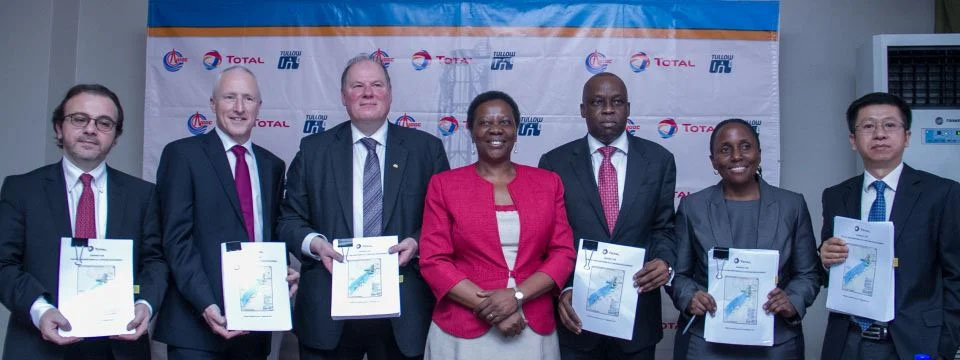14/06/2017 News
Launching of Front End Engineering Design (FEED) for the EA-1 and Northern EA-2 Upstream Project

Kampala, 14 February 2017
Today, the joint venture partners TOTAL, CNOOC and TULLOW have launched the Front End Engineering Design (FEED) studies for the EA-1 and Northern EA-2 Upstream project. During FEED, all necessary technical definition and cost and schedule estimates will be developed to allow the Joint Venture Partners to make a recommendation for a Final Investment Decision (FID), and lead to the project execution and construction phase for the upstream facilities required to produce Uganda’s oil targeted for end 2020. This is indeed a major milestone in the development of the project.
The three companies selected to conduct the FEED are Fluor (partnering with China Petroleum Engineering and Construction Corporation - CPECC), Technip and Chicago Bridge & Iron Company (CB&I). Each of the three companies has experience in the design and construction of similar remote onshore projects elsewhere in the world, and will bring different engineering design philosophies and expertise for the benefit of the project
The three selected FEED contractors have the potential to progress to the next phase of the project, which is Engineering, Procurement and Construction (EPC). As the contractual strategy chosen is a competitive FEED, the two best performing companies on the FEED contract shall be invited to compete for EPC after 6 months of initial design. Results from the FEED studies shall provide the necessary information to fine tune the cost estimate of the project; identify the specific technical expertise, skills and equipment needed for construction.
As the FEED requires a large number of engineers from many different disciplines with first hand experience of similar projects elsewhere in the world, the first phase of the FEED study will be carried out primarily in the respective offices of Fluor, Technip and CB&I.
However, national content being a priority both for the government of Uganda (GoU) and the upstream partners, a key deliverable from each contractor will be to propose a National Content strategy for the delivery phase. This will be one of the performance criteria for selection of the contractor for phase 2 of the FEED and eventual selection of the EPC contractor. In addition, a call for tender is currently being prepared for Enabling Infrastructure design, expected to be awarded in May 2017. Enabling Infrastructure are the works required ahead of any major engineering and construction work, including local access, bush clearing, site preparation, fencing and other tasks of a similar nature, for which Ugandan companies are expected to be involved.
Concurrent with the FEED studies, other activities whose contracts have also already been awarded and are in progress within the upstream project include Environmental & Social Impact Assessment (ESIA) and Land Acquisition & Resettlement Planning (LARP).
Work is also progressing on the contract strategy for the Drilling and Wells Services. Similarly, contracting plans and implementation activities for the for Kingfisher Upstream Development and the East African Crude Oil Pipeline (EACOP) are progressing. All parties to the project, the government of Uganda and the Joint Venture Partners (CNOOC, Total and Tullow) are fully committed and focused to meet the target of first oil by end 2020 and are working very closely together to achieve it.

